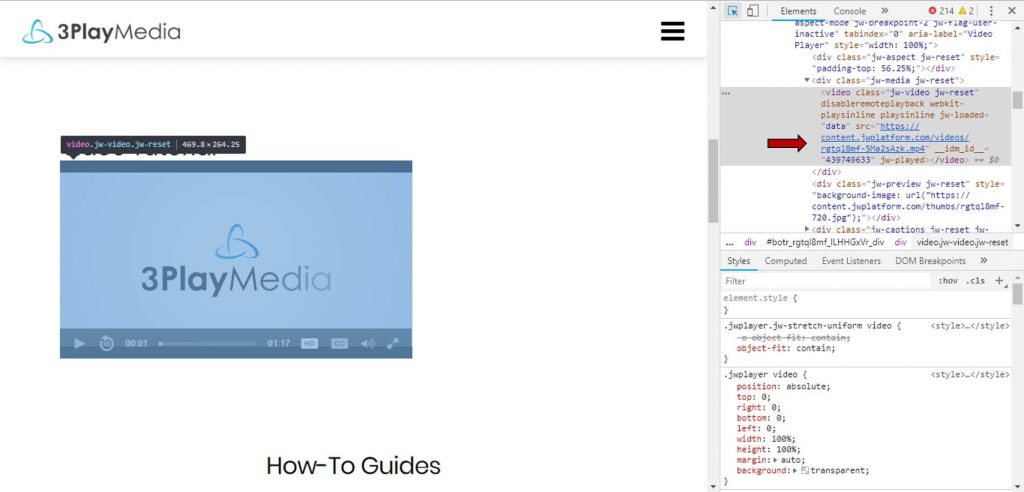The developer teams from Chrome and Firefox1 have announced core changes to how they will handle Flash applications. Despite being an HTML5-first video player, these changes can affect video playback through JW Player. The announcements indicate that the browser itself will decide whether or not a Flash application is core to the viewer's experience. If the Flash object is small and outside of view, the browser will throttle or add an overlay on top of the Flash application, stopping it from fully rendering2. This functionality is aimed to help reduce power consumption and increase battery life. Applications that use HTML5 and native <video> tags will not be affected.
JW Player plugin for Wordpress 🌅. Contribute to jwplayer/wordpress-plugin development by creating an account on GitHub.


JW Player Behavior
- When operating with the default setting JWPlayer should automatically fallback to playing the video with flash if the browser does not support HTML playback for the video file and the Flash plugin is installed.
- From the JW Player site, I located other content delivered by JW Player 6.8.x and it plays as expected. Chrome on Windows 7 plays your video okay. But probably there too it is not using Flash. So I am going to conclude that, since the JW Player in this plugin is version 6.7.x, it may need to be updated to be compatible with Flash 14.
- Free jw desktop player downloader. Multimedia tools downloads - JW Desktop Player by LongTail Video and many more programs are available for instant and free download.
- Download JW FLV Media Player from official sites for free using QPDownload.com. Additional information about license you can found on owners sites. How do I access the free JW FLV Media Player download for PC? Just click the free JW FLV Media Player download button at the top left of the page. Clicking this link will start.
JW Player looks at the video type given to the player and chooses a rendering provider (Flash or HTML5) based on the capability of the browser. If there is a media file that cannot be played in HTML5, JW Player will use Flash to ensure that the video can be viewed. This is important for streaming media as most browsers do not natively support today’s most popular adaptive format, HTTP Live Streaming (HLS) and specifically for video advertisements, which rely heavily on Flash.
Streaming
JW Player uses Flash to support the widely used HLS protocol. Even though there are some browsers that support HLS natively - Safari and the new Microsoft Edge - they do not expose the full functionality of the HLS spec (for example, multiple audio-tracks and DVR window controls).
In order to ensure unthrottled playback when streaming with JW Player, you can do the following:
- Always use a video player that is bigger than 400px by 300px , independent of media formats.
- Use a combination of MPEG-DASH, HLS, and mp4 fallback sources.
DASH will use the native HTML5 video tag and not use Flash at all.
If your video placement requires a smaller size, always provide an mp4 or other HTML5 compatible file as the first source and JW Player will always render without being throttled. This however might be challenging for publishers using JW Player for advertising due to the vast majority of ad units requiring Flash.
Impact on Video Advertising
JW Player chooses an ad creative file from a VAST tag based on the video provider that will be used to play the main video content. If JW Player is going to play a video in Flash, the player will render the ads in Flash. Most publishers force their JW Player setups to use a Flash media provider because the ads returned from their ad server are Flash based. Forcing a player to use Flash still renders a functional video player in HTML5-only environments but publishers without HTML5 ads from their ad partner will not get impressions on those devices.
VPAID is a very popular interface between video player and ad unit that was initially designed to enable a rich interactive in-stream ad experience. In July, 53% of ads played through JW Player were Flash VPAID ads. The majority of these ad units are bulky Flash objects that add real-time bidding, layers of verification and viewability, and extra time to start actual ad playback. The video ad that is returned ends up not being interactive but is likely just an mp4 rendered in Flash.

A number of ad networks are ramping up support for VPAID 2.0, the updated version of the spec which allows for JavaScript-based ad units instead of Flash. These units will allow for the same functionality as their Flash cousins with the added benefit that they will not be throttled and will work in HTML5-only environments. There are however very few VPAID 2.0 JavaScript creatives on the market today and the technology has yet to be fully tested at scale.
As a publisher, you can do the following to make sure your small video players with advertising do not get throttled:
- Remove any settings that force Flash to primary and set up the player with HTML5 first video files.
- Work with your ad partner to ensure you get HTML5-compatible creatives (mp4s, VPAID 2.0 JS).
JW Player will be adding support for VPAID 2.0 JavaScript creatives before the end of Q3. If you have any sample ads, please send them to beta@jwplayer.com so we can guarantee them working at launch.
Jw Player Plugin
Summary
- For now, if your video player is larger than 400px wide and 300px you have nothing to worry about.
- If your site uses Flash videos that are less than 400x300, Chrome and Firefox will likely throttle video playback or block the videos altogether.
- The only way to truly ensure that video playback is not blocked by the browser is to use media formats that do not require Flash. This might take a while as the streaming media landscape shifts from HLS to MPEG-DASH.
- If you are running video in a sidebar and thus need to have smaller video players, make sure the media and ad format will always render in HTML5. Since these video players are small, they likely do not need to take advantage of streaming and can run fine with just an mp4.
1Firefox disabled Flash from its browser until a core security hole was fixed in the plugin.
Jw Player Downloader Plugin Chrome
2Safari has had a power save mode since Safari 7, but it is disabled by default.
